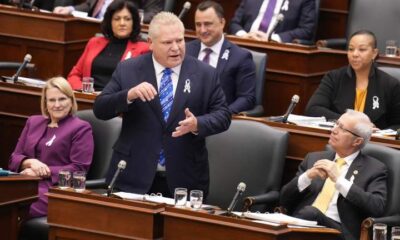Politics
Cambridge Council Meeting Highlights Tensions Over Strong Mayor Powers

The recent budget meeting at Cambridge City Council exposed significant tensions surrounding the implementation of “strong mayor” powers, a controversial governance framework introduced by Premier Doug Ford. Mayor Jan Liggett faced criticism for restricting councillors’ ability to engage with city staff during discussions, raising concerns about transparency and local democracy.
During the meeting, councillors were informed they could propose adjustments to the 2026 budget presented by Liggett but were prohibited from asking questions of city staff. This unusual rule sparked frustration among elected officials, who rely on staff expertise to make informed decisions. For example, Councillor Scott Hamilton expressed reservations about a proposed $750,000 initiative to develop outdoor festival grounds, stating he had only recently learned about the project and needed more information to proceed.
Liggett countered Hamilton’s concerns, asserting that the proposal would not impact the municipal tax levy. Hamilton countered that regardless of its source, public funds were at stake. He attempted to seek clarification from city staff, only to be told by Liggett, “There’s no questions to staff here.” This inconsistency in rules drew criticism, particularly when Liggett later allowed a question from Councillor Mike Devine regarding the current value of a one percent tax levy increase.
As the meeting unfolded, discontent grew among councillors.
“We are interrogating one another without having factual information that we would otherwise be able to get from staff,”
complained Councillor Corey Kimpson. Councillor Adam Cooper echoed these sentiments, stating the inability to communicate with staff hindered their efforts to gather essential facts.
The situation escalated when Devine inquired about the balance in the municipal accommodation tax fund, which is derived from hotel room taxes. Liggett initially estimated the fund at $12 million, only to be corrected by staff, who stated the actual figure was $1.55 million. Just as tensions threatened to escalate further, Liggett called for a short break, after which she announced that questions to staff would be permitted for the remainder of the meeting.
Following the meeting, Liggett described the session as “productive” during a local radio interview, emphasizing that councillors had the opportunity to voice their frustrations. She interpreted the amendments to the rules as a positive outcome. Nevertheless, many observers argue that the meeting could have been more effective had essential information been readily available from the outset.
The challenges presented at the Cambridge council meeting highlight the potential pitfalls of the “strong mayor” framework. Introduced by Ford to empower municipal leaders in housing decisions, the structure grants mayors the authority to propose budgets and veto changes made by councillors. While some mayors adopt a measured approach to this power, others, like Liggett, have faced scrutiny for how they wield it.
As Cambridge prepares for its next budget meeting on November 24, 2023, the council’s ability to function democratically while navigating the complexities of strong mayor powers remains a pressing concern. The need for open communication between elected officials and city staff stands out as crucial for fostering informed decision-making that reflects the interests of the community.
-

 Politics3 weeks ago
Politics3 weeks agoSecwepemc First Nation Seeks Aboriginal Title Over Kamloops Area
-

 World4 months ago
World4 months agoScientists Unearth Ancient Antarctic Ice to Unlock Climate Secrets
-

 Entertainment5 months ago
Entertainment5 months agoTrump and McCormick to Announce $70 Billion Energy Investments
-

 Lifestyle4 months ago
Lifestyle4 months agoTransLink Launches Food Truck Program to Boost Revenue in Vancouver
-

 Science5 months ago
Science5 months agoFour Astronauts Return to Earth After International Space Station Mission
-

 Technology3 months ago
Technology3 months agoApple Notes Enhances Functionality with Markdown Support in macOS 26
-

 Top Stories2 months ago
Top Stories2 months agoUrgent Update: Fatal Crash on Highway 99 Claims Life of Pitt Meadows Man
-

 Lifestyle3 months ago
Lifestyle3 months agoManitoba’s Burger Champion Shines Again Amid Dining Innovations
-

 Sports5 months ago
Sports5 months agoSearch Underway for Missing Hunter Amid Hokkaido Bear Emergency
-

 Politics4 months ago
Politics4 months agoUkrainian Tennis Star Elina Svitolina Faces Death Threats Online
-

 Politics4 months ago
Politics4 months agoCarney Engages First Nations Leaders at Development Law Summit
-

 Technology5 months ago
Technology5 months agoFrosthaven Launches Early Access on July 31, 2025





















